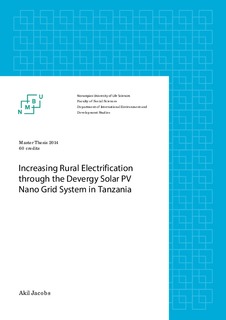| dc.description.abstract | Tanzania is facing energy problems throughout the entire country, but in rural areas where
the majority of the population lives, the energy problems are extreme. Many solutions are
being researched, specifically renewable forms of energy such as solar, biomass, and wind
energy. As a means of allowing inaccessible populations, to gain access to energy. SHS
have been in Tanzania for over 40 years and still the problem of rural electrification exists.
This paper describes a new approach to solving an old problem. It analyzes the benefits and
the drawbacks of the Devergy Nano Grid Solar Approach, in Melela, Tanzania. Also, it
examines the external factors that create barriers for the solar sector and the Devergy the
solar energy company, such as a lack of a renewable energy policy, purchasing power of the
rural population, solar markets, and the current energy statues in the country. This paper is
based on both qualitative and quantitative data, Focus Group Discussions (FGDs) with
consumers, suppliers, and energy institutions, and 80 household surveys within Melela,
Mororgoro and Dar es Salaam in Tanzania. In the paper it is shows the Devergy Solar
Approach in comparison with solar home systems (SHS). It was found that Devergy as a
shared Nano grid system, was able to decrease transaction costs of solar to a level that
allows for more accessibility than SHS in rural areas. Devergy operates as a small energy
company that provides a solar resource, maintains it and through that, eliminates various
barriers stopping many rural villagers from gaining access to electricity. With this new
approach, Devergy focuses on a niche in the renewable solar sector, which is to provide
solar energy that is cheaper and more easily accessible. Also, the issue of not having a
renewable energy policy is addressed within this paper, in terms of its impact on the
development of the sector. | nb_NO |

